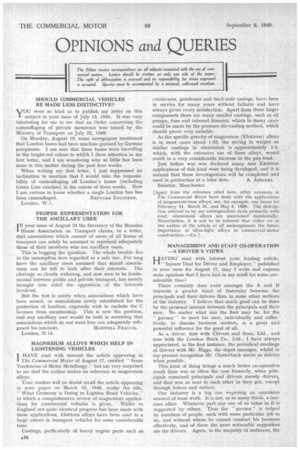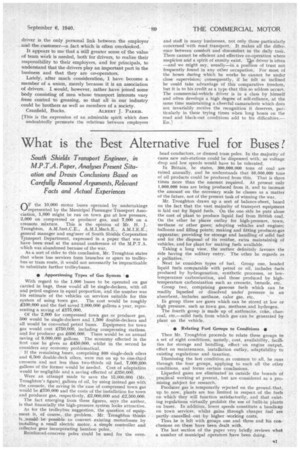OPINIONS and QUERIES The Editor invites correspondence on all subjects
Page 18

Page 19

If you've noticed an error in this article please click here to report it so we can fix it.
connected with the use of commercial motors. Letters should be written on only one side of the paper. The right of abbreviation is reserved and no responsibility for views expressed is accepted. Queries must be accompanied by a stamped, addressed envelope.
SHOULD COMMERCIAL VEHICLES BE MADE LESS DISTINCTIVE?
YOU were so kind as to publish my letter on this subject in your issue of July 13, 1940. It was very interesting for me to see that an Order concerning the camouflaging of private motorcars was issued by the Ministry of Transport on July 22, 1940.
On Monday, August 19, some newspapers mentioned that London buses had been machine-gunned by German aeroplanes. I am sure that these buses were travelling in the bright-red colour to which I drew attention in my first letter, and I am wondering why so little has been done in this matter during the past four weeks.
When writing my first letter, I just suppressed an inclination to mention that I would take the responsibility of camouflaging all London's buses (including Green Line coaches) in the course of three weeks. Now I am curious to know whether a single London bus has
been camouflaged. REFUGEE ENGINEER. London, W.1.
PROPER REPRESENTATION FOR THE ANCILLARY USER IN your issue of August 24 the Setretary of the Mansion House Association on Transport claims, in a letter, that associations -which consist of users of all forms of transport can safely be assumed to represent adequately those of their members who are ancillary users.
This is begging the question. The whole trouble lies in the assumption here regarded as a safe one. For long have the ancillary users assumed that mixed associations can be left to look after their interests. The cleavage so clearly widening, and now seen to be fundamental between public and private transport, has merely brought into relief the opposition of the interests involved. • But the test is .surely when associations which have been mixed, or associations newly established for the -protection of hauliers, expressly wish to exclude the C licensee from membership. This is now the position, and any ancillary user would be bold in assuming that associations which do not want him can adequately safe
guard his interests. MAxwELL FRANCIS. London, N.14.
MAGNESIUM ALLOYS WHICH HELP IN LIGHTENING VEHICLES HAVE read with interest the article appearing in The Commercial Motor of August 17, entitled "Some Tendencies of Motor Metallurgy," but am very surprised to see thaf the author makes no reference to magnesium alloys.
, Your readers will no doubt recall the article appearing in your paper on March 10, 1940, under the title, " What Germany is Doing to Lighten Road Vehicles," in which a comprehensive review of magnesium applications for commercial vehicles is given. Whilst in England not quite identical progress has been made with these applications, Elektron alloys haVe been used to a large extent in transport vehicles for some considerable time.
Castings, particularly of heavy engine parts such as 6.16 crankcases, gearboxes and back-axle casings, have been in service for many years without failures and have always given every satisfaction. Apart from these larger components there are many smaller castings, such as oil pumps, fans and internal fitments, which in many cases could be made by the pressure-die-casting method, which should prove very suitable. • As the specific gravity of magnesium (Elektron) alloys is in most cases about 1.83, the saving in weight on similar castings in aluminium is approximately 1-3, which, with the extensive use of these alloys, would result in a very considerable increase in the pay-load.
Just before war was declared many new Elektron applications of this kind were being developed, and it is natural that these investigations will be completed and used in production at a later date.. . A. ABINERI.
Swinton, Manchester. .
[Apart from Ow reference cited here, other accounts in The Commercial Motor have dealt with the applications of magnesium-base alloys; see, for example, our issues for February 24, March 31, and May 5, 1939. The description referred to by our correspondent deals primarily with steel; aluminium alloys are mentioned incidentally. Nevertheless, it is not to be inferred that either we or the author of the article at all underewtimate the future importance of ultra-light alloys in commercial-motor construction .—ED. ]
MANAGEMENT AND STAFF CO-OPERATION —A DRIVER'S VIEWS
HAVING read with interest your, leading article, "Square Deal for Driver and Employer," published in your issue for August 17, may I write and express some Opinions that I have had in my min' 'd for some considerable time?
There certainly does exist amongst the A and B interests a greater bond of fraternity between the principals and their drivers than in some other sections of the industry. I believe that much good can be done by the personal interest between the principals and their men, No matter what size the fleet may be, for the " guvnor " to meet his men, individually and collectively, to discuss business matters, is a great and powerful influence for the good of all.
As a driver, first with Chivers and Sons, Ltd., and now with the London Brick Co., Ltd., I have always appreciated, in the first instance, the periodical meetings of drivers with Mr. Biggs, the depot manager, whilst in my present occupation Mr. Clutterbuck meets us drivers when possible.
This kind of thing brings a much better co-operative result than was so often the case formerly, when principals remained principals and drivers merely drivers, and that was as near to each other as they got, except through letters and notices.
Our industry is a big one requiring an enormous amount of team work. It is not, as so many think, a oneman affair. Whatever part any one of us takes in it is supported by others. Thus the " guvnor " is helped by numbers of people, each with some particular job to do, and without whom he cannot conduct his business effectively, and of these the most noticeable supporters are the drivers. Again, in the majority of instances, the
driver is the only personal link between the employer and the customer—a fact which is often overlooked.
It appears to me that a still greater sense of the value of team work is needed, both for drivers, to realize their responsibility to their employers, and for principals, to understand that the drivers play an important part in the business and that they are ca-operators.
Lately, after much consideration, I have become a member of a union, merely because it is an association of drivers. I would, however, rather have joined some body consisting of men whose transport interests vary from control to greasing, so that all in our industry could be brothers as well as members of a society.
Cranfteld, Bucks. ALBERT J. PARRIS.
[This is the expression of an admirable spirit which does undoubtedly permeate the relations between employers and staff in many businesses, not only those particularly concerned with road transport. It makes air the difference between comfort and discomfort in the daily task. There cannot be efficient and effective co-operation where suspicion and a spirit of enmity exist. Tbe driver is often —and we might say, usually—in a position of trust not frequently found in any other occupation. For most Of the hours during which he works he cannot be under close supervision; consequently, if he felt so inclined he could take advantage of this comparative freedom, but it is to his credit as a type that this so seldom occurs. The commercial-vehicle driver is in a class by himself and often develops a high degree of self-reliance, at the same time maintaining a cheerful camaraderie which does not invariably receive the recognition it deserves, particularly in these trying times when long hours on the road and black-out conditions add to his difficulties.— ED .]




















































